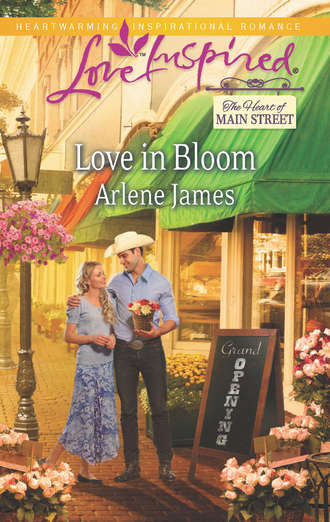
Полная версия
Love in Bloom

A Fresh Start
Lily Farnsworth can thank a mysterious benefactor for the chance to open her own flower shop in Bygones, Kansas. But Tate Bronson is the biggest challenge the relocated Boston attorney has ever faced. Forget about tossing out the welcome mat—the handsome widowed rancher seems determined to keep Lily at arm’s length. As everyone buzzes over the identity of the anonymous donor, Lily’s doing her part to revitalize the struggling town. With the help of Tate’s little girl-turned-matchmaker, can she create a garden of community and love deep in the heart of Kansas…and one special man?
The Heart of Main Street: They’re rebuilding the town one step—and heart—at a time
Tate paused, turned, walked back up the stairs and wagged a finger in Lily’s face.
He’d intended to say something clever, something witty and smart, but when he saw her standing there with that relaxed, happy smile on her face and those deep blue eyes shining behind the lenses of those cute round glasses, every word, every thought went right out of his head except one. He swept his arm around her, folding her close with the crook of his arm. Sliding his free hand over her shoulder blade, he tilted his head and kissed her. This was no accidental kiss.
This was about the woman who made him smile.
ARLENE JAMES
says, “Camp meetings, mission work and church attendance permeate my Oklahoma childhood memories. It was a golden time, which sustains me yet. However, only as a young widowed mother did I truly begin growing in my personal relationship with the Lord. Through adversity He has blessed me in countless ways, one of which is a second marriage so loving and romantic it still feels like courtship!”
After thirty-three years in Texas, Arlene James now resides in Bella Vista, Arkansas, with her beloved husband. Even after seventy-five novels, her need to write is greater than ever, a fact that frankly amazes her, as she’s been at it since the eighth grade. She loves to hear from readers, and can be reached via her website, www.arlenejames.com.
Love in Bloom
Arlene James

www.millsandboon.co.uk
“For I know the plans I have for you,” declares the Lord, “plans to prosper you and not to harm you, plans to give you hope and a future.”
—Jeremiah 29:11
I dedicate this book to my hometown of Comanche, Oklahoma, where good people still do good things for one another every day and faith is still a way of life.
Special thanks and acknowledgment to Arlene James for her contribution to
The Heart of Main Street continuity.
Contents
Prologue
Chapter One
Chapter Two
Chapter Three
Chapter Four
Chapter Five
Chapter Six
Chapter Seven
Chapter Eight
Chapter Nine
Chapter Ten
Chapter Eleven
Chapter Twelve
Chapter Thirteen
Chapter Fourteen
Chapter Fifteen
Dear Reader
Questions for Discussion
Prologue
Placing a folder on her desk, Coraline Connolly looked around at the faces of those she had summoned to her office. Tate Bronson shifted his weight from one foot to the other, feeling much like the boy he had once been, waiting for the ax to fall here in the office of the principal of the school. This time, however, he did not fear that he had been caught pulling pranks on his classmates or carving his and Eve’s initials into the memorial tree at the corner of Bronson Avenue and School Drive. This time his concerns were not anything as sweetly trivial as losing his privileges at recess or writing extra essays. All here knew that the town they loved teetered on the very edge of disaster.
The problems had begun the moment that Randall Manufacturing had closed its doors, throwing seventy percent of the community’s employees out of work. Overnight, Bygones had gone from being one of the most successful small towns in Kansas to a community in decline.
Oh, the townsfolk were still friendly and salt-of-the-earth, willing to give the shirts off their backs to friends and neighbors in need. The original Bronson Homestead, now home to the public library, a spacious park with a sizable playground, charming gazebo and shady pond, still welcomed visitors with its sylvan peace. The lazy streets where children played and houses stood in safety with doors unlocked were still realities of the friendly ambience of the small town. Sadly, however, what they had once taken for granted in Bygones was no longer secure.
In the months since the closing of Randall Manufacturing, other businesses had shuttered. Homes had been abandoned and repossessed as people moved out in search of work. Mayor Langston had even been forced to shut down the butcher department in his grocery store. With revenues dropping like a lead weight in a pail of water, the city had been forced to lay off personnel and scale back services. When the bank branch had closed, the whole town had known that it was in real trouble. Tate couldn’t help wondering if Robert Randall truly realized what he’d done to this community when he’d shuttered his aerospace manufacturing plant.
Miss Coraline, who at sixty had been a fixture at the school for over thirty years, had been deeply disappointed because the annual alumni banquet had been called off due to a lack of funds. Canceling the alumni banquet was the least of the problems for the school, however. Tate very much feared that Coraline had gathered this diverse group today—arguably now Bygones’ most influential citizens—to announce that the school would close entirely, with the county absorbing its students.
As if reading his thoughts, Coraline stood behind her desk and pulled herself up to her full height, which must have been all of an inch over five feet, and said, “You must be wondering why I’ve called you all here.”
Mayor Langston, seated next to old Miss Mars, stacked his hands atop the curved head of his cane and replied, “I hope for good news, but I confess that I expect the opposite.”
“We’ve had nothing but bad news for months now,” Joe Sheridan, the chief of police and an ex-marine, pointed out with a sigh.
“We mustn’t lose hope,” Dale Eversleigh, the colorful, rotund, fortyish town undertaker counseled.
“Easy for you to say,” muttered Elwood Dill, proprietor of The Everything, the town’s most successful retail business. “Your services never go out of demand. I have people buying gasoline one gallon at a time now and eating candy bars for dinner.”
Miss Ann Mars tilted back her snowy head and smiled at the fifty-something, long-haired, tattooed, self-proclaimed “flower child.”
“You’re giving away as many gallons of gasoline and hamburgers as you sell, Elwood, and don’t you deny it.”
Elwood shrugged, and Tate smiled to himself. Elwood and his wife might be a bit unconventional, but like almost everyone else around Bygones, they were good people. The question was if the town founded by Tate’s great-great-grandfather, Paul Bronson, and his brother, Saul, would still be around for these good people or if it would become another of the many ghost towns littering the Kansas plains. Tate looked to Coraline Connolly, who had always been a voice of steady reason in the community.
“Don’t keep us in suspense, ma’am. Why are we here?”
“Answered prayer, Tate,” she announced, smiling as she held up a large empty envelope stamped as Certified Mail. “I do believe it’s answered prayer.” She flipped open the folder on her desk and spread out its contents. “I received this two days ago, and it’s taken me a while to fully understand all of the ramifications. I want you all to know that I consulted an attorney about this before I called you here.”
The mayor picked up one of the papers and began to read, while Miss Mars did the same with another. Miss Mars reported first.
“A holding company is purchasing the entire south side of Main Street!”
“All those empty stores that are now in receivership?” Eversleigh queried, obviously perplexed.
“And updating them!” Miss Mars went on, continuing to read.
“Whatever for?” Joe Sheridan asked.
“New businesses,” Mayor Langston answered, a note of awe in his tone. “In the very heart of Main Street.”
“What new businesses?” Elwood Dill scoffed.
“The new businesses we choose to bring in,” Coraline said, pressing her hands flat upon the desk, “with the grants funded by an anonymous benefactor.”
“I don’t believe this,” Dale Eversleigh exclaimed, all but snatching the paper from Mayor Langston’s hands.
Langston fell back in his chair. “If we can save Main Street, we can save the town.”
“Are you actually saying,” Joe demanded, seeking clarification, “that this is what we’ve been praying for?”
They had been praying, Tate knew. They’d held many a prayer meeting at the Bygones Community Church these past months. Tate had attended none of them, but he knew well what had been said. He knew, too, that God often failed to hear or answer prayer.
“Hold on, now,” he said, determined to be the voice of reason. “Who is this benefactor?”
Coraline shook her head. “I don’t know. Whoever it is insists on anonymity.”
“But why do this for Bygones?”
“I can’t answer that, either, but it must be someone with a connection to the town. We can’t be the only ones who love this place. I keep thinking that it must be a former student. Otherwise why send all this to me? All I know for sure, though, is what’s in these papers.”
Tate thought about that. The school was small. This two-story redbrick building housed all twelve grades and kindergarten, but hundreds of students had passed through its hallowed halls in the time Miss Coraline had been here. Most had now moved on.
“How do we know it’s legitimate?”
“An account has been set up,” Eversleigh reported, looking up from the papers, “and there’s an email address for consultation. All we have to do is put together a committee, set parameters for the grants, take applications, make our choices and apprise our benefactor of them. The monies will then be released to the recipients.”
“The holding company will take care of preparing the shops to accommodate the needs of the businesses that we choose,” Miss Mars reported.
“What have we got to lose?” Chief Sheridan asked excitedly.
“Exactly my opinion,” the mayor agreed, sitting up straight, “and it seems to me that the first order of business is to form that committee. Coraline, since this comes to us through you, I’d say that chore falls in your lap.”
“Which is why I’ve asked you all here,” she told them. “I’ve given this a lot of thought and a lot of prayer, and as far as I’m concerned, you are the committee. If you’re all willing, that is.”
They looked at one another, nodding.
“I think you mean, we are the committee, don’t you?” Tate said to Coraline. She smiled, a look of hope on her face.
“The Save Our Streets Committee,” Elwood quipped with a grin. “SOS for short. Sounds appropriate, don’t you think?”
“Sounds hopeful to me,” Miss Mars all but sang.
“It’s about time something did,” Joe Sheridan said, gulping audibly.
“So long as it works,” Dale Eversleigh intoned.
“Please, God,” Coraline breathed.
“Speaking of work,” Mayor Langston said, reaching for a pen from the utensil cup on Coraline’s desk, “I have some ideas about those grant parameters...”
Tate hung back as the others bent over the principal’s desk, eagerly following the mayor’s line of thought as he sketched it out with notes. Though he was by far the youngest member of this ad hoc committee, his thoughts had gone back in time.
No one could have asked for a better place to grow up than Bygones, Kansas. No one could ask for a better place to raise their daughter. No one grieved the calamities that had befallen their hometown or feared its demise more than Tate. But anonymous benefactors and mysterious holding companies were almost as difficult for Tate to accept as a God who heard and answered the desperate prayers of His children. For no one knew better than Tate how little God truly cared.
Still, as an heir of the founding family—which was no doubt why Miss Coraline had chosen him for the SOS Committee—Tate would do all that he could to save the town. Never mind that he didn’t live within its city limits. A ranching and farming family, the Bronsons lived on a large acreage outside of town, but their forebears had platted the city’s streets, established its institutions, sent their children to its school, shopped in its stores, called its citizens their friends and neighbors—and buried their dead in its cemetery. This was his town, and like everyone else around here, he’d lost enough already. So, he made up his mind.
Anonymous benefactor or no anonymous benefactor, Bygones, Kansas, wasn’t going down without a fight. That meant Tate Bronson would do everything in his power to make this crazy scheme work. The others could pray all they wanted, but Tate would keep a clear head and make wise choices. They’d bring new blood and new businesses to town, and with them would come hope and, maybe, just maybe, new life.
Chapter One
The pavement outside the Kansas City Airport radiated heat even though the sun had already sunk below the horizon. Tate held his nearly eight-year-old daughter’s hand a little tighter and resisted the urge to shake out his long legs and hurry along as they crossed the traffic lane to the sidewalk. He pushed back the brim of his straw cowboy hat and squinted against the dying sunshine to read the signs hanging overhead.
“That’s it down there,” he said, pointing. “Baggage Claim A.”
They hurried in that direction, Isabella skipping ahead. The hem was coming down on the back side of her favorite purple T-shirt. He’d have to ask his mom to buy her a new one to match the embroidery on her favorite pair of jeans. Meanwhile Ms. Lily Farnsworth would just have to excuse his daughter’s attire, as well as his lateness. And the heat.
Lifting his hat, he mopped his forehead with his shirtsleeve. The first day of July had dawned hot and clear. He hoped that Ms. Farnsworth, being from Boston, was prepared for what she would find here in Kansas.
Lily Farnsworth was the last of six new business owners to arrive, each selected by the Save Our Streets Committee, dubbed the SOS, of the town of Bygones. As a member of the committee, Tate had been asked to meet her at the airport in Kansas City, transport her to Bygones and act as her official host and contact. With the Grand Opening just a week away, most of the shop owners had been at work preparing their stores for some time already, but Ms. Farnsworth had delayed until after her sister’s wedding, assuring the committee that a florist’s shop required less preparation than some retail businesses. Tate hoped she was right.
He still wasn’t convinced that this scheme, financed by a mysterious, anonymous donor, would work. But if something didn’t revive the financial fortunes of Bygones—and soon—their small town would become just another ghost town on the north central plains. Tate thought of the school where he had met his late wife and of the cemetery where he had buried her nearly eight years ago, and he ached to think of those places abandoned and forgotten, so he would do what he could to revive the community.
Isabella stopped before the automatic doors and waited for him to catch up. He did so quickly, and they entered the cool building together. A pair of gleaming luggage carousels occupied the open space, both vacant. A few people milled about. Some wore uniforms of one sort or another; most just seemed to be waiting. One, a tall, slender, pretty woman with long blond hair and round tortoiseshell glasses, perched atop a veritable mountain of luggage. She wore black ballet slippers and white knit leggings beneath a gossamery blue dress with fluttery sleeves and hems. Her very long hair parted in the middle and waved about her face and shoulders. As he watched, she gathered that pale gold hair in slim-fingered hands with tiny knuckles, twisted it into a long rope and pulled it over one shoulder. Her gaze touched his then skittered away. He felt the insane urge to look closer, behind the lenses of those glasses that gave her a calm, intelligent air, but of course, he would not.
For one thing, Tate Bronson did not interest himself in attractive women. For another, that could not be Lily Farnsworth. Lily Farnsworth was a florist from Boston, not a blonde—he glanced back at the woman seated on the baggage—with the air of a ballet dancer and librarian combined. He turned away, the better to resist the urge to stare, and scanned the building for anyone who might be his florist. Maybe he should have made a sign; but then, he wasn’t a limo driver. He was a rancher and farmer trying to help keep his town from dying a slow, certain death. He’d have felt like an idiot standing there with a hand-lettered sign.
One by one the possibilities faded away, greeted by others or disappearing on their own. Finally Isabella gave him that look that said Dad, you’re being a goof again. She slipped her little hand into his, and he sighed inwardly. Of course the pretty blonde was not a ballet dancer or librarian at all. And she’d packed up half of Boston to bring with her. Even with the long-bed pickup truck out there in the parking lot, a good number of those suitcases and boxes would have to go into the backseat with Isabella. So, an idiot with or without the sign. Great. Turning, he walked the few yards to the luggage mountain and swept off his straw cowboy hat.
“Are you Lily Farnsworth by any chance?”
A slender forefinger with a blunt tip and a knuckle so delicate it seemed made of paste came up to push those round glasses more firmly onto a nose as straight and fine as a blade. She nodded just once and rose, brushing at her filmy skirt, a clear blue like the darkly fringed eyes behind the lenses of her glasses. Her ivory-pink skin, completely devoid of cosmetics, showed a sprinkling of freckles across cheeks that bunched into pale apples when she smiled—and what a smile it was. She had perfect lips, wide and mobile, not too thin and not too thick, a luscious natural dusty pink against blindingly white, even teeth. A square-tipped chin on an oval face completed the picture.
“I’m Lily,” she said in a voice as gossamery as her skirts. “You must be Tate Bronson. What a pleasure it is to meet you. I was expecting a grizzled old rancher, not a handsome, young...well...”
She bowed her head, her blond hair flowing forward to hide her reddening face. Tate frowned, not at all liking the way his heart sped up. Yep, no sign needed. He was perfectly capable of behaving like an idiot without any props.
* * *
Looking down at her comfortable flat slippers, Lily willed away the color swamping her face. Honestly, she’d gotten over this awkwardness long ago. Hadn’t she? If only she hadn’t been staring at him all this time, she’d have had more control of her tongue. That and fatigue had gotten the better of her. To get the best price, she’d flown from Boston to Atlanta to Kansas City, which had made for a long day. Suddenly she wished she’d taken more pains with her appearance, but why bother when she was so tall and thin and wore glasses? Men generally failed to notice her at all, and when they did, they treated her like their sisters or their maiden aunts. This one would barely even look at her. No doubt his wife was the next thing to a fashion model. A man as attractive as him would naturally marry a woman like that.
Tall and muscular, with thick, dark brown hair worn so short that the circular cowlicks at his crown and the center of his forehead were clearly visible, he had smooth features and warm brown eyes in a squarish face marked by dimples even when he wasn’t smiling. Given the thickness of his hair, his brows seemed surprisingly slender, and if he had a fault then it was the thinness of his lips. Or was that simply his frown? The little redheaded imp with him seemed undeterred by his scowl. She skipped forward and put out a chubby hand.
“Hi! I’m Isabella. I’m seven, almost eight. How old are you?”
“Isabella,” Tate Bronson scolded. “You don’t ask a lady her age.”
“Why not? I’m a lady, and I told her mine.”
“I’m sorry,” Bronson apologized, his frown softening. He really was quite attractive, especially when he wasn’t frowning. “My daughter is looking forward to her birthday later this month, but that’s no excuse for her being rude.”
“That’s all right,” Lily said with a smile. Switching her gaze to the girl, Lily bent forward. “It’s a pleasure to meet you, Isabella.” Dropping her voice to a stage whisper, she confessed, “I turned twenty-seven on May Day.”
Isabella cut her blue-eyed glance up at her father, drawling, “Twenty-seven’s good. Daddy’s twenty-seven. His birthday’s in September. Then he’ll be twenty-eight.”
Lily felt a jolt of surprise. Twenty-eight with an eight-year-old. That made him a very young father.
Tate made an impatient sound and said, “Can we get going, please? We have a long drive ahead of us.”
“Oh, of course,” Lily said apologetically, gathering her voluminous handbag and backpack. She slung one over each shoulder, stacked two of the smaller boxes atop one of the larger wheeled bags and prepared to haul out the lot.
“Wait,” Tate said. “Let’s do this with some organization.”
Feeling chastised, Lily ducked her head, her long hair sliding forward. “Okay. Uh, what would you suggest?”
He pulled up the handle on one of the smaller wheeled bags and handed it to Isabella, then tossed a box onto his shoulder and snagged the handle of the larger bag from Lily, saying, “Wait here with the rest. We’ll take out these and be back.”
Lily bit back a protest. Those were vases and other glass items balanced on his shoulder, going-away gifts from her friends in Boston, things to help her get started in Bygones. Her former employer and coworkers knew how carefully she had budgeted to make this plan feasible, even selling her beloved car to raise the necessary funds to match the grant and choosing a shop with living quarters above it to cut expenses. She had packed those particular items carefully for shipping and sent them ahead of her to be collected when she arrived at the airport; she supposed they would survive Tate Bronson, so she bit her lip and watched him walk away without saying a word. His daughter followed him, her long red curls bouncing merrily. Lily noticed idly that the hem of the child’s purple T-shirt had come down, but her mind was too preoccupied with her new venture to assign any significance to that fact.
While helping her sister pick out flowers for her upcoming wedding, the florist, a former employer of Lily’s, had surreptitiously handed her a newspaper article about a place in Kansas taking applications for matching grants for businesses willing to locate in the small town of Bygones. The applicants had to submit a business plan, deposit funds equal to the amount of the requested grant, agree to hire locals and complete a minimum two-year residency. Failure to maintain the required residency and keep the business in operation would constitute a default, in which case, the grant would have to be repaid within five years. Knowing that Lily hated what she was currently doing for a living and much preferred the work that she’d done while attending college and graduate school—namely, floral design—this friend and former employer had encouraged Lily to apply for one of the grants.









